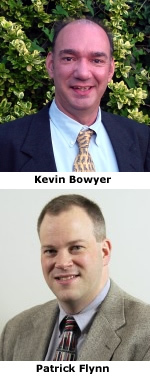
In the summer of 2001, Kevin W. Bowyer and Patrick J. Flynn joined the University of Notre Dames Computer Science and Engineering Department.
Bowyer was hired from theUniversityofSouth Floridato chair the department and Flynn came to Notre Dame fromOhioState. Acquainted with each other through previous research and professional collaborations, they planned to jointly pursue their research interests in the general area of computer vision. They secured funding from the National Science Foundation to establish their research laboratory within weeks of their arrival. While they initially envisioned future collaborations in the area of robot vision and medical image analysis, they also had plans to pursue joint work in biometrics.
The terrorist attacks ofSept. 11, 2001, focused and accelerated those plans and the result has been the emergence of a distinctive and prominent research program in biometrics
A biometric is a stable and distinctive physiological feature of a person that can be measured and used to identify them; a fingerprint is probably the most familiar example. Bowyer and Flynn have been researching the feasibility of image-based biometrics and multi-biometrics since 2001, including first-of-a-kind comparisons of face photographs, face thermograms, 3-D face images, iris images, videos of human gait and even ear and hand shapes.
The thrust of our research is to evaluate the practicality, performance and usefulness of these technologies as a means of recognizing people,Bowyer said.
That effort has enabled the researchers to assemble the largest database of multi-modal biometrics in the world.
Interest in biometrics technologies and commercial efforts to capitalize on that interest has grown exponentially since 9-11. As a result, federal agencies examining the feasibility of these technologies are in need of teams that can define and executechallenge problemsdesigned to assess biometric system performance on a level playing field to minimize biases. Increasingly, these agencies are using Bowyer and Flynns research expertise to foster such objective analyses.
Our group has established itself as an honest brokerin biometric system evaluations,Flynn said.Our funding from the National Science Foundation and other agencies and companies supports both this evaluation work and our own basic research in advanced biometrics.
In the five years since the 9-11 attacks, Bowyer and Flynns research program has produced four masters theses, five doctoral dissertations, over 20 articles in peer-reviewed journals and approximately $3.5 million in research funding.
* Contact: * _Kevin W. Bowyer, Schubmehl-Prein Chair and Professor of Computer Science and Engineering, 574-631-9978, bowyer.2@nd.edu , or Patrick J. Flynn, professor of computer science and engineering, 574-631-8803, flynn@nd.edu .
_ __
TopicID: 19022